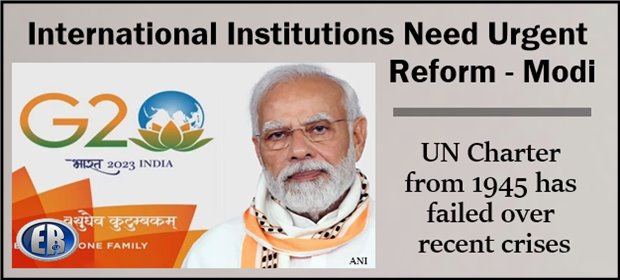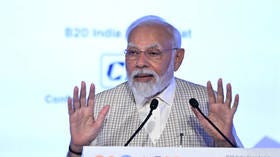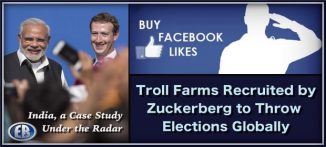
India Calls For Urgent Review of UN Charter. Calls UN Anachronistic & Explains A New Order Is Taking Shape With India’s Model of “Development For All” As A Guiding Principle of “Welfare Of The World”
Indian Prime Minister Narendra Modi speaks up before the G20 summit: believes global institutions don’t fit today’s realities and should be reformed to better reflect the new multipolar world order.
India, like us over here at Interest of Justice (IOJ), thinks there should be some serious reforms in the UN.
Actually IoJ is strongly thinking the UN should just be proven to have no immunity for their commercial and ultra vires acts, thoroughly prosecuted, labelled a hard core cabal by a judge, promptly defunded, and forever abolished along with all forms of communism, (we are working on it daily) but here is the Indian PM in his own words:
“Like a new world order was seen after World War II, a new world order is taking shape post-Covid. The parameters of influence and impact are changing and this needs to be recognized,” he said, adding that New Delhi’s ‘Sabka Saath Sabka Vikas’ model, which means ‘development for all’, has shown the way in India and can also be a guiding principle for the “welfare of the world.”
Modi unveiled his ambitious vision for India over the next two decades, envisioning a developed, inclusive, innovative, and corruption-free nation.
Apart from reform, India also called for an urgent review of the U.N. Charter from 1945, citing Article 109 that had said a “review conference” must be held within a decade of the original charter being adopted. Apart from three amendments on expanding the U.N.SC and the ECOSOC, it has not been updated yet.

Video link: https://www.bitchute.com/video/HLoLwGodE2wK/
Indian Prime Minister Narendra Modi believes global institutions don’t fit today’s realities and should be reformed to better reflect the new multipolar world order
Read more from RT.com below:
Modi outlines New Delhi’s G20 priorities, says ‘every voice’ matters
The Indian leader said the upcoming summit will focus on the climate and the debt crisis
RT
India’s presidency in the G20 is a testament to its growing role in the world, Prime Minister Narendra Modi said ahead of the event. Once perceived as merely a huge consumer market, India is now seen as a global player capable of tackling challenges from the pandemic to larger crises faced by humanity, he added.

.
In an interview with the PTI news agency released on Sunday ahead of the G20 summit, which New Delhi will host next weekend, Modi issued a stark warning against “irresponsible” financial policies and advocated for a steadfast commitment to financial discipline. He stressed that while populist measures may yield short-term political gains, the long-term social and economic consequences can be devastating.
Modi’s comments came as he discussed the global debt crisis, which he acknowledged as a pressing concern, particularly for developing nations. As leaders from around the world prepare for the G20 summit, Modi highlighted the growing importance of financial discipline, especially among countries grappling with debt crises. He noted that he has urged state governments to prioritize financial responsibility, recognizing that sound financial policies are critical for a nation’s stability and growth.
Emphasizing inclusive growth, one of the priorities of India’s G20 presidency, Modi said that the GDP-centric view of the world is now shifting to a human-centric one. “Like a new world order was seen after World War II, a new world order is taking shape post-Covid. The parameters of influence and impact are changing and this needs to be recognized,” he said, adding that New Delhi’s ‘Sabka Saath Sabka Vikas’ model, which means ‘development for all’, has shown the way in India and can also be a guiding principle for the “welfare of the world.”
“Irrespective of the size of the GDP, every voice matters,” Modi said as he underscored efforts towards greater inclusion for the Global South, especially the African continent, in global affairs.
The prime minister also took the opportunity to reflect on India’s recent political stability, noting that it had paved the way for significant reforms in various sectors, including the economy, education, banking, and finance. He attributed this period of growth to a stable government with predictable policies and a clear vision for the nation.
Modi unveiled his ambitious vision for India over the next two decades, envisioning a developed, inclusive, innovative, and corruption-free nation. He pledged that by 2047, India would stand among the world’s developed countries, with an even more inclusive and innovative economy, improved health and education outcomes, and the eradication of corruption and casteism.
Celebrating India’s rapid ascent from having the tenth largest economy to the fifth largest in less than a decade, Modi said:
“For a long time, India was perceived as a nation of over 1 billion hungry stomachs. But now, India is being seen as a nation of over 1 billion aspirational minds, more than 2 billion skilled hands, and hundreds of millions of young people.”
When asked whether the G20 gathering would likely end with a consensus and a common declaration adopted given the differences in approaches to the issue of including the Ukraine conflict in the G20 agenda, Modi stopped short of commenting on the issue directly.
However, he reiterated New Delhi’s stance: “There are many different conflicts across various regions. All of them need to be resolved through dialogue and diplomacy. This is our stand on any conflict anywhere. Whether as G20 president or not, we will support every effort to ensure peace across the world,” the Indian leader said. “We have repeatedly emphasized that a divided world will find it difficult to fight common challenges,” he added.
The G20, a grouping of the world’s largest economies representing around 85% of global GDP and over 75% of global trade, comprises 19 countries (Argentina, Australia, Brazil, Canada, China, France, Germany, India, Indonesia, Italy, Japan, South Korea, Mexico, Russia, Saudi Arabia, South Africa, Turkey, the US, and UK) and the EU.
Related news from April 2023:
Angry with reform delays, India calls U.N. system ‘anachronistic’
Indian ambassador says U.N. Charter has failed in handling COVID, Ukraine, terror, climate change; all eyes on June meeting of Inter-Governmental Negotiations on way forward for UNSC expansion, U.N. reform
April 27, 2023
Indian ambassador Ruchira Kamboj was speaking at a session convened by Russia that called for a discussion on how to make multilateralism effective “by defending the UN Charter”. File
With another year of meetings on reforming the United Nations — and particularly the question of the expansion of the Security Council — coming to a close in June, India lashed out at the U.N. system with its most scathing attack thus far.
In a speech at the UNSC this week, the Indian Permanent Representative called the U.N. Charter “anachronistic”, adding that it has failed in handling the COVID-19 pandemic, the Ukraine war, terrorism and climate change. Indian ambassador Ruchira Kamboj was speaking at a session convened by Russia that called for a discussion on how to make multilateralism effective “by defending the U.N. Charter”.
Veto for all or none
Ms. Kamboj also called for expanding the Security Council’s permanent membership and hit out at the “veto power” given to the “P-5” of the U.S., the U.K., France, Russia and China.
“Can we practise ‘effective multilateralism’ by defending a Charter that makes five nations more equal than others, and provides to each of those five, the power to ignore the collective will of the remaining 188 member states?” Ms. Kamboj asked at the meeting chaired by Russian Foreign Minister Sergey Lavrov on Monday. This is the first time India has specifically criticised giving the veto to the P-5, clarifying its stand that in any expansion of the Security Council, the veto must be given to all members, or none.
Reforms too slow
The tough words in the Indian speech are a reflection of India’s frustration at the slow pace of the Inter-Governmental Negotiations (IGN) process, as well as its determination to keep U.N. reforms at the top of the global body’s agenda even though India is not in the Security Council this year, officials said. The IGN process, which began in 2008 is now in its 15th year, and though a draft text of the reforms proposed was presented in 2015, there is little indication that negotiations on the basis of a text will begin in the near future.
Ms. Kamboj also called for a “clear attribution of groups and member states” or naming those who oppose expansion for specific countries, indicating the “United For Consensus” group that includes Argentina, Italy, Mexico, Pakistan and Turkey. All eyes will now be on the next IGN session in June, the last for this year — where national statements of various countries will be “webcast” live for the first time — that will discuss the way forward in the process.
Veto system ‘abuse’
Significantly, at the U.N.SC meeting this week, many joined India’s voice of concern about the process, and about the lack of representation for Africa, South America and Asia. China is the only Asian P-5 member.
“A majority now acknowledge that the Security Council itself would benefit from reforms that reflect today’s geopolitical reality. The same is true for the Bretton Woods institutions [the World Bank and the IMF]. They do not reflect the reality of today’s global economy,” U.N. Secretary General Antonio Guterres said during the debate. France and at least nine temporary U.N.SC members — including Australia, Canada, Singapore, Lebanon and Ghana — all voiced their disapproval of the veto-system, and its “abuse” by permanent members. Many of them directly referred to Russia’s invasion of Ukraine.
Charter review overdue
Apart from reform, India also called for an urgent review of the U.N. Charter from 1945, citing Article 109 that had said a “review conference” must be held within a decade of the original charter being adopted. Apart from three amendments on expanding the U.N.SC and the ECOSOC, it has not been updated yet.
Criticising the U.N. Charter “where two of the permanent members have not been able to get even their names changed”, Ms. Kamboj referred to the fact that the Charter still recognises the “Union of Soviet Socialist Republics” and the “Republic of China” rather than Russia and China. In addition, an official pointed to the fact that Japan, Italy and Germany are still referred to as “enemy states” according to their status in the Second World War, despite their positions in the global order today.
************
Source

••••
The Liberty Beacon Project is now expanding at a near exponential rate, and for this we are grateful and excited! But we must also be practical. For 7 years we have not asked for any donations, and have built this project with our own funds as we grew. We are now experiencing ever increasing growing pains due to the large number of websites and projects we represent. So we have just installed donation buttons on our websites and ask that you consider this when you visit them. Nothing is too small. We thank you for all your support and your considerations … (TLB)
••••
Comment Policy: As a privately owned web site, we reserve the right to remove comments that contain spam, advertising, vulgarity, threats of violence, racism, or personal/abusive attacks on other users. This also applies to trolling, the use of more than one alias, or just intentional mischief. Enforcement of this policy is at the discretion of this websites administrators. Repeat offenders may be blocked or permanently banned without prior warning.
••••
Disclaimer: TLB websites contain copyrighted material the use of which has not always been specifically authorized by the copyright owner. We are making such material available to our readers under the provisions of “fair use” in an effort to advance a better understanding of political, health, economic and social issues. The material on this site is distributed without profit to those who have expressed a prior interest in receiving it for research and educational purposes. If you wish to use copyrighted material for purposes other than “fair use” you must request permission from the copyright owner.
••••
Disclaimer: The information and opinions shared are for informational purposes only including, but not limited to, text, graphics, images and other material are not intended as medical advice or instruction. Nothing mentioned is intended to be a substitute for professional medical advice, diagnosis or treatment.






Leave a Reply